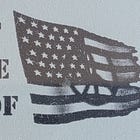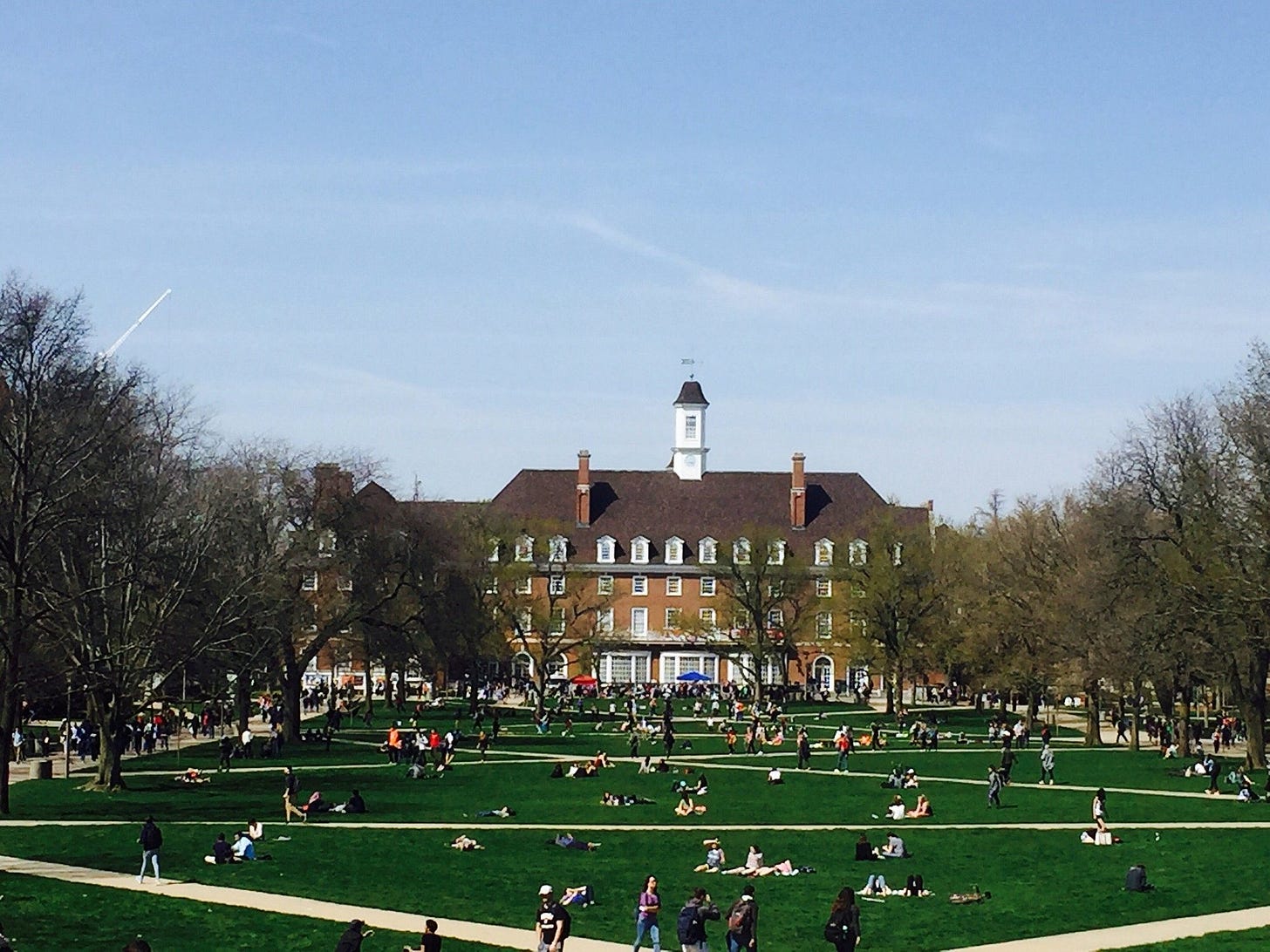What We Were Thinking Of, 3
“The water's edge is a good place for secrets”
What We Were Thinking Of is available for full productions and readings. Interested parties may contact me through my Substack email address.
⇐ Part 2, “Where is my daughter? Who are my sons?”
⇒ Part 4, “People are trying new ways to live”
Homo Vitruvius and American Samizdat serve as homes for my weekly creative writing and intellectual exploration. HV persists as my original and primary Substack in these pursuits; AS arose in resistance to Trumpism and is dedicated to its defeat. From memoir and poetry to fiction and drama, mostly in HV, to history and political philosophy, predominantly in AS, you will find it here. The stacks may be subscribed jointly or singly in Manage Subscription.
Your likes, comments, shares, and recommendations, and your free and paid subscriptions help gain attention for writing you appreciate and aid the mission to offer a renascent light against the darkness: art, information, culture, and ideas for a free, tolerant, and democratic people. Even the modest monthly subscription rate of $2 gains access to the full archive.
All writing at Homo Vitruvius is free during the week of its publication. It then moves into the paid subscriber archive. At the new monthly subscriber rate, access to the archive costs only $2 per month. Your paid monthly subscriptions and, if you can afford it, your annual subscriptions, are deeply appreciated and help sustain my writing. However, What We Were Thinking Of will be an exception. Access to each installment — to the whole play as it publishes — will remain free for the length of the serialization.
♦︎ ♦︎ ♦︎
Recap last week: As David conducts a book tour for Culture Wars, he receives a mysterious and disturbing letter. The complicated relationships of his life are revealed.
This week: Charles visits David, Bud, and their new college friend Sara in their dorm, freshman year, 1966. David visits Charles and Renata in fall 1990 to inform them of the mysterious letter from Bud. David and Charles argue.
Bud and Sara enter, center stage, Bud carrying a box of books into his college dormitory room. David looks at them, walks past Kate, on whom lights dim, to join them. Charles enters.)
CHARLES
(to Bud)
I've met with the dean. Seems like a good man. Astute. Hello, David.
DAVID
Mr. Powell.
(Charles looks at Sara.)
SARA
(extending her hand)
Sara Flannery. Hello.
(They shake hands. Charles looks around.)
CHARLES
Well, you seem...almost settled.
(He looks into the box of books, picks one up and examines it.)
CHARLES
(continuing)
"Ba-ba-Ram-Das?"
(another book)
"The Age of Permanent Revolution."
(and another)
"The Port Huron Statement."
(On the screen above, from the Port Huron Statement: "We are people of this generation, bred in at least modest comfort, housed now in universities, looking uncomfortably to the world we inherit.")
CHARLES
(continuing)
Interesting reading. I've never seen these at home.
BUD
That's my personal library.
CHARLES
Personal? Or private?
BUD
An interesting distinction.
CHARLES
Yes, it is. Do you understand it?
(David and Sara glance at each other. David has seen this before.)
CHARLES
(continuing)
Well, I won't disturb you and your friends. I just came to say good-bye.
(He holds out his hand rather formally. Bud shakes it. Charles touches David's shoulder, smiles at Sara as he leaves.)
DAVID
(to Sara)
Bud's father's in the State Department. We think he used to be in the CIA.
BUD
Probably still is.
SARA
Are you serious?
(looking after Charles)
I've never met a CIA agent before.
BUD
(hushed tone)
You still haven't. He was never here.
(as David and Sara laugh)
At least he wasn't for me.
DAVID
I find him interesting.
BUD
(to Sara, leading her away)
David's political education is still in the formative stage. It's what comes of reading novels for the pleasure of it.
(David watches them go, then turns as Charles and Renata enter.)
RENATA
(extending her hands to clasp David's)
It's so wonderful to see you, David. It was such a surprise when you called. We've been seeing you on TV, though, reading about you. It's been ... How long has it been?
DAVID
A few years.
RENATA
Yes. Hasn't it been? How time ... Oh, I'm descending into cliché, aren't I? I hate that. The world seems cliché enough, sometimes, without old people cluttering it up with more for want of fresh ideas. Come, there's so much to talk about. We should have some tea, some sandwiches. What would you like?
DAVID
Anything you prepare will be perfect, Renata.
RENATA
I love this young man, Charles. I always have. A gentleman always, just like his -- just like you. Why don't you two go sit out by the water while I fix a light lunch. I'll call when I'm ready.
(Renata exits.)
DAVID
She doesn't change. She's so...
CHARLES
Genteel, I think, is the word. Makes my life bearable, sometimes when… it's not. That and the Chesapeake. A kind of retreat.
(pointing the way)
Shall we?
(They walk out toward a bench by the water's edge.)
CHARLES
(continuing)
So, then, if I understood you, in the fall you'll be taking over the Center?
DAVID
Well, I'll be the director. It's a little too democratic a place for anyone to want to think of me as "taking over."
CHARLES
Still confusing leadership with tyranny after all these years.
DAVID
(smiles)
Retirement hasn't dulled your blade.
CHARLES
Oh, that's when you most have to keep it sharpened.
DAVIID
Really? Why is that?
CHARLES
That’s when your enemies come for you — when they think you’ve let your guard down.
DAVID
So, no rest, then, ever?
CHARLES
In this world?
(beat, shifting)
I have noticed some advancement on your part, though. Now you're quoting Clausewitz on TV. Risky business, that, for -- what do you call yourself these days -- a "progressive"? Of course, now you're more of a celebrity, ivory tower type. Not much at the barricades anymore.
(David shakes his head with a laugh. He raises his arm and waves it.)
DAVID
White flag. I surrender. Mercy.
(Charles pats him on the back. He motions for them to sit. They look out at the water.)
DAVID
(continuing)
It is very beautiful.
CHARLES
(nodding, beat)
So, is it time yet to share your secret?
DAVID
My secret?
CHARLES
You're almost like a son to us, David. You noticed Renata's --
(David nods.)
CHARLES
(continuing)
But you haven't paid your first visit in nearly four years to share your professional accomplishments with us. And you didn't share your purpose with Renata. So I guess that you have a secret. The water's edge is a good place for secrets.
DAVID
And we share one already.
CHARLES
Do we? I have so many secrets. I don't often share them.
DAVID
You share one with me.
CHARLES
(beat)
Yes. I do.
(David pulls the envelope with Bud's note from his pocket, offers it to Charles. Charles looks but doesn't reach for it.)
CHARLES
(continuing)
Let me light up first.
(Charles takes out a pipe and cloth pouch. He fills the pipe with tobacco and tamps it down with the comfort of ritual, lights up, puffing. He takes the envelope and reads the note. Thoughtful but unemotional, he returns the note to the envelope and hands it back to David.)
DAVID
I thought you should know.
CHARLES
Thank you for not opening it in front of Renata.
DAVID
Are you going to tell her?
CHARLES
(not answering)
What are you going to do?
DAVID
What am I going to do?
CHARLES
He wrote to you.
DAVID
He's your son, Charles.
CHARLES
I know what he is to me.
DAVID
We haven't heard from him in --
CHARLES
-- ten and half years. And now he's written -- that. What exactly is that supposed to change?
DAVID
For all we knew he was dead.
CHARLES
I never imagined he was dead. I knew he was out there somewhere. And now he still is.
DAVID
We thought we had lost him.
CHARLES
And have we regained him? You thought you lost him ten and a half years ago. I lost him long before that.
DAVID
So we do nothing?
CHARLES
We? He's written to you, David. The question is, what are you going to do? Are you going to try to find him?
DAVID
I don't know. I thought maybe --
CHARLES
-- I would tell you what to do? Maybe look for him myself? Why the reluctance to look for him on your own? He's reached out to you. Are you afraid to reach back?
DAVID
I wouldn't know where to begin.
CHARLES
The postmark. Salt Lake City would seem a reasonable start.
(beat)
Twenty years ago all you young people wanted to do was delve into the past, unearth all the complexities, dig up all the nasty little secrets. Shed the pure and simple light of day on other people's difficult choices. Now that it's your own life, you're not so eager.
DAVID
Is that the way you rationalize it? "Difficult choices"? Judgment calls? No right? No wrong?
CHARLES
They're all rationalizations, David. It's just that some are better than others.
DAVID
You have no compassion for him at all?
CHARLES
Compassion? Don't talk to me of compassion. What compassion did he have when he blew up that laboratory? When he killed that guard?
DAVID
It was an accident. He served his time.
CHARLES
He was willing to take the chance. With the guard's life, with his daughter's, the mother of his daughter, his parents'. Where was his compassion, for everyone, when he just went off and disappeared? You all think it's some kind of a game --
DAVID
Charles, please, don't condescend to me. I came --
CHARLES
You do. You think it's a game. You think there are "do overs." You play at revolution, and when you get into some real trouble, you want mommy and daddy to come rescue you, tell the serious people out there -- the really serious people -- "Oh, it was just pretend. He didn't mean it. He's a nice boy. Nice, middle-class boy from a good American home, whose mommy and daddy love him and will always be there for him no matter what, like after a bad dream. Can't we just do it all over?" There was a bad dream, David. He was the bad dream. And there's no doing it over.
(putting out his pipe, standing)
You ask me about compassion? Sometimes compassion has to see far, not near. Sometimes it has to see the long run, not the short.
DAVID
Then it's just an idea, Charles. Then it's no different from him.
CHARLES
And sometimes, when it's near, it's weakness, foolish weakness, and other people pay the price because you couldn't stand the pain. Well, I can stand the pain. I always have stood it. And judging by that note, you may have to find out if you can. Now let's go eat Renata's food. She's pretty near, and I can see that far.
(David remains seated as Charles leaves.)
AJA
⇐ Part 2, “Where is my daughter? Who are my sons?”
⇒ Part 4, “People are trying new ways to live”
Poet. Storyteller. Dramatist. Essayist. Artificer.








The fantastic dialogue continues. The revelations timed perfectly.
And I am intrigued. What’s in Salt Lake City? Why the reach out now?
"Twenty years ago all you young people wanted to do was delve into the past, unearth all the complexities, dig up all the nasty little secrets. Shed the pure and simple light of day on other people's difficult choices. Now that it's your own life, you're not so eager." I'm really enjoying the exchanges between David and Charles. It reminds me a little of parts of "Les Mains Sales".